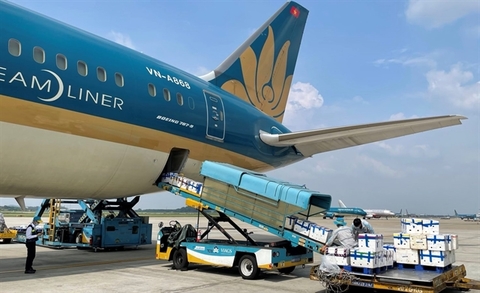
The air logistics of Viet Nam have significant room for growth, driven by the enforcement of free trade agreements that will boost the goods circulation volume. — VNA/VNS Photo Hoang Tuyet
Viet Nam needs to have an appropriate strategy to promote the development of air logistics and tap its large potential, experts have said.
Le Vuong Quoc, director of Gemix Viet Nam Joint Stock Company, which exports fresh fruits, said that shipping fresh farm produce to Switzerland was not easy because this country did not have seaports. As there were no direct flights from Viet Nam to Switzerland, his company must ship through a third country.
Quoc said this pushed up transportation costs, and his company could only export in a small volume.
In addition, air freight rates in Thailand were always around 30 per cent lower than in Viet Nam, plus there is a direct route from Thailand to Switzerland, which makes it difficult for Vietnamese firms to compete with Thailand.
Nguyen Dinh Tung, general director of Vina T& T Group Import – Export Company, said transporting agricultural products by air would ensure quality and shorten the time compared to by railway or by sea. However, high air logistics charges remained a limitation.
Tung pointed out that many Vietnamese airlines had not yet built routes to countries like Switzerland, Canada and the US, and shipping largely depended on foreign airlines.
In a recent workshop, Wackerbauer Lars, senior advisor of IPP Air Cargo, the first cargo airline in Viet Nam, said that more than 80 per cent of Viet Nam’s logistics market was in the hands of foreign companies. Meanwhile, the freight demand kept increasing, fuelled by the boom of e-commerce.
What made Viet Nam’s air logistics less competitive was that the freight rates remained high, he said, adding that airlines had not paid adequate attention to and poured adequate investment in air cargo transportation while the infrastructure system was limited.
Statistics of the Ministry of Industry and Trade showed that the market share of international airfreight of three domestic carriers, Vietnam Airlines, Vietjet Air and Jetstar Pacific, was around 12-15 per cent, while the rest was foreign airlines.
Meanwhile, the air logistics of Viet Nam had significant room for growth, driven by the enforcement of free trade agreements which would boost the goods circulation volume.
According to the International Air Transport Association, air logistics of Viet Nam could expand at an average of 6.7 per cent per year in 2015-35, higher than the world average at 3.9 per cent and 4.6 per cent of the Asia-Pacific region.
In 2021 when the COVID-19 pandemic was complex, international passenger transportation dropped by 93 per cent to 500,000, but cargo transportation increased by 21.3 per cent to 1.1 million tonnes over 2020.
Among five major airlines in operation in Viet Nam, none had professionally and separately invested in cargo transportation. IPP Air Cargo which specialises in cargo transportation is waiting for approval.
Airlines should cooperate with enterprises in the logistics industry to establish an air logistics chain to make transportation more convenient and efficient at more reasonable costs.
According to Tran Thanh Hai, Deputy Director of the Import-Export Department under the Ministry of Industry and Trade, Viet Nam has huge potential for developing air logistics.
However, ground infrastructure was one of the major challenges.
Airport infrastructure had not invested adequately for cargo freight. There are currently 10 international airports in Viet Nam, but only two of them, Noi Bai and Tan Son Nhat, have centres for air logistics.
Little attention was being paid to developing specialised centres for air logistics, which required large scale development and the integration of services and connectivity to reduce logistics costs.
It was necessary to have a strategy and cooperation with enterprises and organisations in the logistics industry to promote air logistics development, Hai said.
“An appropriate development strategy is important for air cargo transportation to take off,” Hai said. — VNS